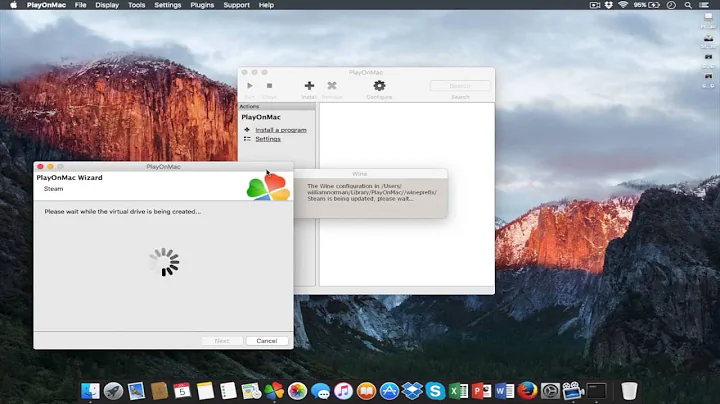How do you make Windows 7 fully case-sensitive with respect to the filesystem?
Solution 1
You can set the HKLM\SYSTEM\CurrentControlSet\Control\Session Manager\kernel\ dword:ObCaseInsensitive registry value to 0 as other authors suggested. Create a file named add.reg with the following content and run it.
Windows Registry Editor Version 5.00
[HKEY_LOCAL_MACHINE\SYSTEM\CurrentControlSet\Control\Session Manager\kernel]
"obcaseinsensitive"=dword:00000000
Then use Cygwin to work with case-sensitive filenames.
In order to do so, you need to mount NTFS filesystems with posix=1 option in your /etc/fstab, as this article suggests. Here's a snippet from my fstab:
none /cygdrive cygdrive binary,posix=1,user 0 0
C: /cygdrive/c ntfs binary,posix=1,user,auto 0 0
C:/Users /home ntfs binary,posix=1,user,auto 0 0
Once the above is done, you'll be able to deal with case-sensitive filenames using bash, mc, git etc.
Solution 2
All these settings that you can find on the web are for NFS not for NTFS (note the difference)!
NFS (Network File System) is a network protocol.
Thus changing the registry key HKLM\SYSTEM\CurrentControlSet\Control\Session Manager\kernel\obcaseinsensitive WILL NOT change anything you want.
NTFS is case-sensitive but Windows API is NOT, it only remembers the filename case. This mean that despite your file is displayed as AbC.TXT it is still accessible by abc.txt and aBc.TxT. This is a limitation of Windows, not NTFS.
The other one HKEY_CURRENT_USER\Software\Microsoft\Windows\CurrentVersion\Explorer\Advanced\DontPrettyPath basically turns off the normalization of legacy 8.3 filenames used by DOS (which are all caps). When it is turned on (default) ABC.TXT will be displayed as Abc.txt, but still be accessible by all other variations.
To be more accurate:
Actually it depends of the software that accesses the FS.
If it uses WIN32 API (which 99.9% of the software does) it will be case-insensitive whatever you do. All built-in software in Windows (like Explorer, command prompt, Internet Explorer and etc.) and all consumer software out there uses WIN32 and is always case-insensitive.
NFS Service, Java and some others are POSIX and they will obey the 'obcaseinsensitive' registry setting. However turning off the option might actually get you bigger problems, because this software can create files that are not accesible from Windows itself and other Win32 software.
Solution 3
In order to actually create 2 files with the same name but different case in the same directory, you need to install Unix Services 3.5 but this only works on 32 bit Windows. Then you need to run "C Shell" to create the files. You can't create the files through explorer. Once created, explorer doesn't play nice with the files. If you go to rename the second one, the cursor jumps to the first one. Also, most applications can only open one of the files, as they expect a case-insensitive file system. If you are on 64 bit install Cygwin and change it to case sensitive.
I was trying to emulate a Linux case-sensitive file-system for debugging purposes during development. It seems the better approach is to use VMWare with an instance of Ubuntu for development.
Solution 4
I think this is what you're looking for:
http://www.chilkatsoft.com/p/p_454.asp
This page recommends setting HKLM\SYSTEM\CurrentControlSet\Control\Session Manager\kernel\ dword:ObCaseInsensitive to 0 to make it case-sensitive. I think you found this already though, and this looks like the standard way to do it (even the Microsoft KB you found suggests it).
It looks like you have to change kernel settings. Beware of updates though.
EDIT: Watch out though, some programs might depend on case insensitivity.
EDIT: You could probably use a UDF partition. This filesystem is case-sensitive and I think it works on both Windows and Linux.
Solution 5
What Microsoft has to say about NTFS and changing case sensitivity.
Looks like you do not have to change the kernel to allow case sensitive lookups on the network.
http://technet.microsoft.com/en-us/library/cc783185(WS.10).aspx
.
Configuring case sensitivity for file and folder names
Applies To: Windows Server 2003 R2
To configure case sensitivity for file and folder names using the Windows interface Open Microsoft Services for Network File System: click Start, point to Programs, point to Administrative Tools, and then click Microsoft Services for Network File System.
If necessary, connect to the computer you want to manage.
Right-click Server for NFS, and then click Properties.
Click the Filename Handling tab.
Do one of the following:
To enable case-sensitive file and directory name lookups, select the Enable case sensitive lookups check box.
To disable case-sensitive file and directory name lookups, clear the Enable case sensitive lookups check box.
Click Apply.
Important These changes will not take effect until Server for NFS is restarted. For information about how to stop and start Server for NFS, see Starting and stopping Server for NFS. You also need to disable Windows kernel case-insensitivity in order for Server for NFS to support case-sensitive file names. You can disable Windows kernel case-insensitivity by clearing the following registry key to 0: HKLM\SYSTEM\CurrentControlSet\Control\Session Manager\kernel DWORD “obcaseinsensitive”
To configure case sensitivity for file and folder names using the command line Open the command prompt.
To enable case sensitivity, type the following:
nfsadmin server [ ComputerName ] config casesensitivelookups=yes
To disable case sensitivity and optionally specify the case of file names returned by Server for NFS, at a command prompt, type the following:
nfsadmin server [ ComputerName ] config casesensitivelookups=no [ntfscase={upper | lower | preserve}]
Argument > Computer Name = The name of the computer you want to configure.
Important These changes will not take effect until Server for NFS is restarted. For information about how to stop and start Server for NFS, see Starting and stopping Server for NFS.
Note The ntfscase option sets the case sensitivity for the NTFS file system. The default case sensitivity is preserve (preserve case). To view the complete syntax for this command, at a command prompt, type: nfsadmin server /?
.
Related videos on Youtube
ANIME4154142
Updated on September 18, 2022Comments
-
ANIME4154142 almost 2 years
My teacher gave us a practice assignment for studying in my Operating Systems class. The assignment was to pipe three processes together and implement the commands in the title all at once. We are only allowed to use these commands when implementing it:
dup2() one of the exec() fork() pipe() close()I can pipe two together but I don't know how to do three. Could someone either show me how to do it or at least point me in the right direction?
Here is my code so far:
#include <stdio.h> #include <stdlib.h> #include <unistd.h> int main() { int pfd[2]; int pfdb[2]; int pid; if (pipe(pfd) == -1) { perror("pipe failed"); exit(-1); } if ((pid = fork()) < 0) { perror("fork failed"); exit(-2); } if (pid == 0) { close(pfd[1]); dup2(pfd[0], 0); close(pfd[0]); execlp("ps", "ps", "-ef", (char *) 0); perror("ps failed"); exit(-3); } else { close(pfd[0]); dup2(pfd[1], 1); close(pfd[1]); execlp("grep", "grep", "darrowr", (char *) 0); perror("grep failed"); exit(-4); } exit(0); }Any help would be appreciated. Heck a tutorial on how to complete it would be wondrous!
-
 The Paramagnetic Croissant over 9 yearsin order to replicate the semantics, you don't have to pipe anything. (You could do
The Paramagnetic Croissant over 9 yearsin order to replicate the semantics, you don't have to pipe anything. (You could dosystem("ps -ef | grep USERID | wc")as well.. Since this is simple text search, you could just read the process table and count the occurrences of the user ID. -
 The Paramagnetic Croissant over 9 years@JonathanLeffler well,
The Paramagnetic Croissant over 9 years@JonathanLeffler well,exec()is there, so... (my advice wasn't usingsystem(), just read the second part of my comment.) -
 Jonathan Leffler over 9 yearsI don't think the proposed duplicate is a sufficiently good duplicate; it is dealing with a deadlock problem because of lack of closes, rather than 'how to do the job at all'. The solution is just about sufficient for the pipeline in the question; it is not as complete as it should be for general use.
Jonathan Leffler over 9 yearsI don't think the proposed duplicate is a sufficiently good duplicate; it is dealing with a deadlock problem because of lack of closes, rather than 'how to do the job at all'. The solution is just about sufficient for the pipeline in the question; it is not as complete as it should be for general use. -
pilcrow over 9 years
-
 Jonathan Leffler over 9 yearsDammit; I don't like SO removing my carefully written comments! @pilcrow — I said, before SO removed it, something along the lines of: I agree that there are probably other questions which cover this situation. I like the answer to the second question linked in your second comment as a duplicate (Connecting n processes with pipes in a shell?; that makes a good duplicate. Thank you for doing the researching.
Jonathan Leffler over 9 yearsDammit; I don't like SO removing my carefully written comments! @pilcrow — I said, before SO removed it, something along the lines of: I agree that there are probably other questions which cover this situation. I like the answer to the second question linked in your second comment as a duplicate (Connecting n processes with pipes in a shell?; that makes a good duplicate. Thank you for doing the researching.
-
-
 ChrisF about 13 yearsCan you post more information from the page you link to please. Don't copy the whole thing but you can copy the relevant paragraph and summarise the rest.
ChrisF about 13 yearsCan you post more information from the page you link to please. Don't copy the whole thing but you can copy the relevant paragraph and summarise the rest. -
Mateusz Jamrocki about 13 yearsWell, the whole page only is a paragraph. I'll make a quick edit though.
-
Breno Macena about 13 yearsThanks tjameson. Regarding programs that might depend on case insensitivity, this is indeed a big problem. A program might look for "WINDOWS" and not find it because it is really "Windows" now, right? Shoot, I'm at a loss trying to figure out how to copy things over from Linux to Windows, and I've found myself in a situation where folders of the same spelling with different caps exist in one location.
-
Mateusz Jamrocki about 13 yearsWell, the only thing I can think of is to conflicts manually. If you copy files over, Windows should ask you if you want to merge or make a copy or something. I can't remember (I'm a linux man myself).
-
 harrymc about 13 yearsAccording to this article this only works for non-Win32 subsystems, so doesn't apply to NTFS.
harrymc about 13 yearsAccording to this article this only works for non-Win32 subsystems, so doesn't apply to NTFS. -
Mateusz Jamrocki about 13 yearsI added an option for UDF. This will circumvent the problem.
-
 Moab about 13 yearsYou are also correct that it presents a security issue if you do. "For example, a version of edit.exe infected with a Trojan horse-type malicious program, and named EDIT.EXE, could be stored in the same directory as edit.exe. If a user were to type edit at a Windows command prompt, the Trojan horse version (EDIT.EXE) could be executed instead of the standard version"..technet.microsoft.com/en-us/library/cc732389.aspx
Moab about 13 yearsYou are also correct that it presents a security issue if you do. "For example, a version of edit.exe infected with a Trojan horse-type malicious program, and named EDIT.EXE, could be stored in the same directory as edit.exe. If a user were to type edit at a Windows command prompt, the Trojan horse version (EDIT.EXE) could be executed instead of the standard version"..technet.microsoft.com/en-us/library/cc732389.aspx -
 harrymc about 13 yearsThe question was for NTFS.
harrymc about 13 yearsThe question was for NTFS. -
Mateusz Jamrocki about 13 years@harrymc Yeah, I understand that, but I left it as an option. My answer says how to do it in NTFS, but using a separate UDF partition may also be a viable solution...
-
Mateusz Jamrocki about 13 yearsIt probably won't crash Windows unless you rename key files/folders. I'm pretty sure that Windows makes sure to use the correct case, in fact, they even recommend it.
-
 Moab about 13 yearsThen he will have to do the registry hack.
Moab about 13 yearsThen he will have to do the registry hack. -
Breno Macena over 12 yearsHmm, that's interesting tjameson. Can you provide a link to that recommendation?
-
Breno Macena over 12 yearsThanks for those EDITS tjameson. That stuff about UDF is interesting. I wonder if any apps that encounter problem with case-sensitivity turned on will also face the same problem in Windows with UDF?
-
Rhys about 12 years@tjameson have you ever loaded Safe mode and watched the files? Defiantly not proper case for all of them.
-
Rhys about 12 yearsActually, on a FS level before additional processing it IS case sensitive, however, NTFS translates all file names to all uppercase and when one with lowercase characters is entered translates it to uppercase then looks for said file.(see support.microsoft.com/kb/103657)
-
venimus about 12 yearsYou are right. I just tried to explain it simpler.
-
kreemoweet about 12 yearsThe Registry is chock-full of references to system files with wildly inconsistent case usage. Case-sensitivity would cause massive breakage.
-
 Behrouz.M about 10 yearsApplies To: Windows Server 2008 R2
Behrouz.M about 10 yearsApplies To: Windows Server 2008 R2 -
niutech about 10 yearsAccording to Microsoft, "Filenames are Case Sensitive on NTFS Volumes"
-
 harrymc about 10 years@niutech: This article is about Windows NT 3.1, and only says that an application can use case insensitivity. Of course nobody uses it, except as Microsoft did - in POSIX compliance tests.
harrymc about 10 years@niutech: This article is about Windows NT 3.1, and only says that an application can use case insensitivity. Of course nobody uses it, except as Microsoft did - in POSIX compliance tests. -
 Ira Baxter over 9 yearsSo how does a Win32 based version of java succeed in finding "SHORT.class" vs. "Short.class" if they are in the same directory? I cannot believe there is NO call to do this.
Ira Baxter over 9 yearsSo how does a Win32 based version of java succeed in finding "SHORT.class" vs. "Short.class" if they are in the same directory? I cannot believe there is NO call to do this. -
venimus over 9 yearsI think because Java is POSIX
-
ANIME4154142 over 9 yearsThe thing is I don't know what I need to write for the third part. Like what should I add to the code to make wc work. And what should I add to the code to make the second pipe. And how do I make the second fork? Can you choose whichever one of these questions you think is important and show me the actual code?
-
ANIME4154142 over 9 yearsat the very least can you show me where I need to put the third command code? and what I need to write it as like do I make it and else statement or if?
-
ANIME4154142 over 9 yearsThank you very much. I really appreciate it. In fact I'm learning alot. Would the program work though if I took out the stuff after NOTREACHED?
-
 Jonathan Leffler over 9 yearsThe close brace after
Jonathan Leffler over 9 yearsThe close brace after/*NOTREACHED*/is the end of themain()function; you'll need that. The headers and code after that implement theerr_syserr()function used liberally in themain()function. If you remove it from there, you'll have to either change the calls in themain()function or provide it somewhere else. If you like, you can consider the function as a cover forperror()plusexit(); you could rewrite it as:void err_syserr(const char *msg, int status) { perror(msg); exit(status); }and you could modify the calls in my code to use your error messages plus a status. -
 Jonathan Leffler over 9 yearsThe
Jonathan Leffler over 9 yearsThe/*NOTREACHED*/comment is stylized and was used withlint(back in the days whenlintwas useful because compilers didn't have the cross-module information about function interfaces -- which means before C89 standard compilers became universal, meaning before circa 1995). It indicates that the flow of control in a function does not reach this point (so the fact that there isn't areturn 0;at the end is harmless. Of course, with C99 or C11, there is an implicitreturn 0;there anyway. -
ANIME4154142 over 9 yearsHi one last final question. What is the reason for changing the process with grep in it to an if statement.
-
 Jonathan Leffler over 9 yearsYou have three processes; the
Jonathan Leffler over 9 yearsYou have three processes; theif (pid2 == 0)is true for the child that needs to rungrep, and false for the parent which needs to runwc -l. Note that this code avoids all the issues of waiting for children to die because it simply runs the commands (the exit status of the sequence is the exit status of thewccommand). In a shell, you'd need the parent to continue after the commands in the pipeline complete, which requires a bit more coding. -
William over 8 yearsI edited your question to be more cohesive/accurate but you are welcome to revert the changes.
-
William over 8 yearsYou must restart for this to take effect.
-
Петър Петров over 8 years"use VMWare with an instance of Ubuntu for development" => Not the case with games
-
Harry Johnston almost 8 yearsI'm fairly sure that the standard Java runtime (i.e., from Oracle) is not case-insensitive on Windows. If you tried to put
SHORT.classandShort.classin the same directory, it wouldn't work. (Of course if they are inside a .jar file there's no problem.) -
Bass over 7 years@William: I believe you only need to terminate all Cygwin processes and services (like Apache, sshd, etc.). That should be enough, as
cygwin1.dllwill be unloaded from RAM. -
William over 7 yearsI'm talking about
HKLM\SYSTEM\CurrentControlSet\Control\Session Manager\kernel\ dword:ObCaseInsensitivesupport.microsoft.com/en-us/kb/929110 -
 phuclv about 7 yearsit's not correct. For example you can create files differed only in case in Ubuntu and Windows can still work without crashing superuser.com/q/1116625/241386
phuclv about 7 yearsit's not correct. For example you can create files differed only in case in Ubuntu and Windows can still work without crashing superuser.com/q/1116625/241386 -
 harrymc about 7 years@LưuVĩnhPhúc: Bash on Ubuntu on Windows is a special case. From your link: "You can't access to those folders in Explorer, simply because the Win32 subsystem doesn't support case sensitivity, and Explorer doesn't support POSIX subsystem".
harrymc about 7 years@LưuVĩnhPhúc: Bash on Ubuntu on Windows is a special case. From your link: "You can't access to those folders in Explorer, simply because the Win32 subsystem doesn't support case sensitivity, and Explorer doesn't support POSIX subsystem". -
 phuclv about 7 yearsbut what you said
phuclv about 7 yearsbut what you saidI am quite sure that if you managed to make NTFS case-sensitive, Windows will crash and re-installation will be the only solutionis completely incorrect. First, NTFS already supports case sensitive and nothing else needs to be done. Windows support is another problem. MS has saidPOSIX Support: NTFS is the most POSIX.1 compliant of the supported file systems because it supports the following POSIX.1 requirements: Case Sensitive Naming:in your link above. Second, no crash will happen even when there are files with same case-insensitive name -
 phuclv about 7 yearsyou don't even need Ubuntu on Windows to work with case-sensitive files. Windows supported POSIX subsystem decades ago, and applications that are carefully designed can work with those files without problem
phuclv about 7 yearsyou don't even need Ubuntu on Windows to work with case-sensitive files. Windows supported POSIX subsystem decades ago, and applications that are carefully designed can work with those files without problem -
 harrymc about 7 years@LưuVĩnhPhúc: With all respect, you don't know Windows API and disk tables well enough.
harrymc about 7 years@LưuVĩnhPhúc: With all respect, you don't know Windows API and disk tables well enough. -
 phuclv about 7 yearsyes, I'm not proficient in Windows API but I know that "NTFS, names preserve case, but are not case sensitive" is wrong, and "Windows will crash and re-installation will be the only solution" is also wrong
phuclv about 7 yearsyes, I'm not proficient in Windows API but I know that "NTFS, names preserve case, but are not case sensitive" is wrong, and "Windows will crash and re-installation will be the only solution" is also wrong -
 harrymc about 7 years@LưuVĩnhPhúc: Let's say that our knowledge differs, but mine is based on experience. Bash etc. on Windows just simulates case-sensitive, as Windows is not built to do that.
harrymc about 7 years@LưuVĩnhPhúc: Let's say that our knowledge differs, but mine is based on experience. Bash etc. on Windows just simulates case-sensitive, as Windows is not built to do that. -
Danijel almost 4 yearsThanks so much for the
posix=1info.


![How To Disable Action Center in Windows 7 [HD]](https://i.ytimg.com/vi/rfa0x589fRE/hq720.jpg?sqp=-oaymwEcCNAFEJQDSFXyq4qpAw4IARUAAIhCGAFwAcABBg==&rs=AOn4CLC0OiRwPBCrXnHaTulFEUluAPgqbw)

